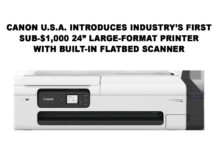
Initially when I was thinking about entrepreneurship, I wanted to write about the young and exciting minds opening start-up companies in our industry. After all, a large majority of the printing industry is made up of small firms with less than 99 employees. In my mind, three friends in a garage, screen printing t-shirts for rock bands was somehow the quintessential example of an entrepreneur. Then I started to think some more about the landscape of the printing industry. All reports indicate that print is primarily male and aging. This group of experienced males holds a majority of our industry in their hands. Why should we care?
Well, while there will always be three friends in a garage potentially buying out a small company of which the owner is retiring, there are not nearly enough of them to form a smooth succession plan for our industry as a whole. Meaning, we need to find more “t-shirt printing types” and we need to make sure that they’ll be successful before all the knowledge and experience is gone.
Clearly, my quirky idea of what an entrepreneur looks like first needs to be examined. There are many different ways to explore what makes up an entrepreneur. One may say it’s as simple as a competent person with a good idea and access to capital. Having known many of these entrepreneurial spirits in my life, I would say it’s a bit more complicated than that. I belong to the school of thought that believes entrepreneurs are a result of their personality types. Now, of course, there are also different types of entrepreneurs. For example, some may say that Jack Welsh is a hero, while Donald Trump is a superstar. Either way, it seems like no matter what type of entrepreneur you are, the one point of convergence is a strong personality.
One of the most widely used ways to identify personality types is through the Myers-Briggs Type Indicator (MBTI) test. This questionnaire test assesses your personality based on four dichotomies that can combine into 16 different personality types. These include extroversion/introversion, sensing/intuition, thinking/feeling and judging/perceiving. Each of the 16 types have their strengths and weaknesses with five in particular being commonly identified as being entrepreneurial: ISTP, ESTP, ENTJ, ENTP and ENFP. Let’s have a closer look at each of these types.

Of the five types, this is the only entrepreneurial type that is introverted. While some call this type the “craftsman” type, a more current description would be an engineer. The strengths of this type include the ability to analyze and then quickly solve complex problems. ISTPs have an appreciation for efficiency and are happiest in action-oriented, technical environments. This seems like a probable type for our industry. I know a lot of printers who have a very strong appreciation for their equipment, and constantly push the boundaries.

Nicknamed the “doer,” individuals with this personality type are known to be straight-shooting risk takers. They have a natural ability to quickly assess their environment, make decisions and execute. This is a powerful combination when you consider the many necessary decisions when starting and running a business. Given the pace of digital change today, ESTPs may find themselves thriving in our industry.

Much like the engineer, ENTJs value efficiency. These “executives” types are outspoken and born to lead. But they run a tight ship, with little patience for poor choices. They are quick to judge, and equally quick to take charge of a situation. These individuals are problem seekers, mostly because the more complex the problem the happier they are to provide a solution. They have a hard time taking people’s feelings into consideration. Perhaps you know that one person in the industry whom you wouldn’t want to cross, but know will get the job done.

Intelligent, enthusiastic and full or potential, these “champions” inspire and motivate others. If you are observing ENFPs from afar, you may think that they lack direction. This is simply because they are not guided by what they are doing but rather how. They have a core set of values that they take with them throughout the many projects they like to get involved in. Sometimes finishing the projects is the hard part.

Have you ever had that thought, “I wish I’d thought of that” when you see a cool new gadget? The person who thought of it was likely a visionary and inventor or in other words, an ENTP. This type is second best at evaluating their environment (after the ENFP). This ability sometimes nicknames these types as “lawyers.” The difficulty for the ENTP is not generating the clever idea, but rather the execution. ENTPs have a difficult time with details when they are under stress. Their strengths will therefore shine with a detail-oriented partner at their side.
Now that we know a bit about the entrepreneur, let’s take a look at what happens in their business. For this article, I chose to look at family businesses for three reasons. Firstly, one of the arguments in entrepreneurship literature is that it is a hereditary skill. Secondly, there is an added level of complexity when you have the system of family come into play. Lastly, it is no secret that the printing industry has a feeling of small — as a whole, we function a little bit like a family.
Firstly, entrepreneurship itself regardless of industry seems to be a family affair. A USA Today article recently pointed to the fact that nearly 50 percent of people who start a business also had parents who were self-employed. While there are not a ton of studies in this area as entrepreneurship is quite new in academia, the Journal of Business Venturing does suggest a genetic link. More specifically, it’s likely that our genes predispose us to traits that support the lifestyle. For example, most entrepreneurs (with the exception of our ISTP example) are extroverted. Further, they have lower levels of risk-aversion, helping them deal with the uncertainties of owning a business.
The flip side of this argument is that this predisposition is less nature and more nurture. Children of entrepreneurs are exposed to the lifestyle early, and begin learning entrepreneurial behaviours from their parents. That old “monkey see, monkey do” adage comes to mind. In cases of successful entrepreneurship, children see first hand the payoff of hard work.
Now, being an entrepreneurial family is not without its complexities, but what we are looking at here are family businesses where the entrepreneurs co-exist. So why is this complex? Families have a structure that leaks into the business. You have father and son, and boss and worker — that seems simple enough. However, studies indicate that there is one real point of complexity in this dynamic and that is the hand-off. A study by Morris, Williams and Nel (1996) suggests that this point comes at a trigger event typically tied to the senior family member stepping down in some way. The study looks at factors that contribute to a successful succession plan. This is important because with the amount of expertise looking to retire within the next 10 years, our industry will need a massive succession plan as a whole.
A succession plan involves identifying the future leaders in your business — many would agree that just having children working with you is not enough of a solution in this way. Of course, a written plan is typically more effective than a verbal one because it forces you to examine the future in a logical sequence. Handler (1991) suggests that the transition of succession has three stages which are training of the heir, involvement in the business, to leadership and succession. The roles shift quite significantly as well from sole operator to consultant for the current generation, and from helper to leader for the next generation.
Given this dramatic change, Morris et al. suggest three factors of focus: preparation of the heir, relationships with family members as well as planning and control activities. The results of the study show that in a successful transition the heirs tended to be educated, with a college degree as a norm. They have some experience outside of the family business, however contribute for an average period of nine years before taking on operational control. They tend to join the company with an entry-level position. Interestingly, they also join the company out of their own desires with encouragement from the preceding generation, of course. Perhaps most importantly, 42 percent of the study’s participants felt unprepared to take over.
In addition, successful transitions are also attributed to a healthy and close family life. High levels of trust and strong sense of values were associated with successful transitions of ownership. Lastly, the study revealed that little formal succession planning was conducted (with 16 percent of the firms with a formal plan). The plans that were in place had a strong emphasis on tax planning. One would imagine that with a higher percentage of firms participating in formal succession planning that the success rate of the transitions would increase.
Let’s take a look at some examples of entrepreneurs in our industry. If these men don’t make you question that there may be an “own your business” gene, I don’t know what will.
 There is the Willow Printing father/son team, Lew and Jeff Ekstein. When I began speaking with these two men, the first thing that became apparent is the sense of ownership they felt over their accomplishments. I think this is so very unique to entrepreneurs — Lew calls it pride of ownership. Jeff Ekstein, is the third generation to be at the helm of Willow, with Lew still acting as an advisor and chairman for the company.
There is the Willow Printing father/son team, Lew and Jeff Ekstein. When I began speaking with these two men, the first thing that became apparent is the sense of ownership they felt over their accomplishments. I think this is so very unique to entrepreneurs — Lew calls it pride of ownership. Jeff Ekstein, is the third generation to be at the helm of Willow, with Lew still acting as an advisor and chairman for the company.
As we begin talking about entrepreneurship, Lew is first to point out that it is quite different now than it was when he first decided to join his father as a printer. “I used to be the guy doing all the work,” he says. While for his father, an entrepreneur is someone who works hard to build a business, for Jeff the description is a bit different — “Innovative risk-taker, who can think out of the box!”
The core values that have held Willow together for three generations include hard work, honesty, respect for self and employees, integrity and, most of all, pride.
There is also generally a strong sense of family in the shop. Jeff reminisces growing up in the shop, where no one was afraid to play pranks on the owner’s son. “I remember, they signed a petition to have me turn off my radio because they didn’t like my music!”
While we continue the conversation, I sense the mutual respect these two share —in fact, they are quite a bit alike. They explain that of the two, Jeff is the tough one and Lew is the softie; however, their Myers-Briggs profiles are the same. They are both extroverted and sensing, and split on the other two dichotomies. It is really difficult to assess split profiles as these individuals tend to pick from a larger pool of behaviours depending on the situation. However, I can sense pieces of the ESTP profile that we called “doer,” which makes a lot of sense, as they both seem to be advocates of change. “We’ve been in transition since Gutenberg” says Jeff.
I ask them how they dealt with the succession plan for Willow. They explain that they simply sat down one day and talked. Jeff calls this a verbal contract. Of course, having grown up in the company and working for five years formally, he remembers he was ready to take over. He stresses that the greatest thing his father ever did for him was to not pressure him to join Willow. He has taken on the same philosophy for his children, explaining that everyone should love what they do. That is what gets us through the tough times.
 Also following that philosophy is Don Gain, the president of Harmony Printing. While, Don is happy that his son Don Gain Jr. decided to join the company, there was certainly no pressure for him to do so. Now as director of sales and marketing, Don Jr. explains that joining the team at Harmony happened by way of an epiphany of sorts. He was presented with an opportunity to move into sales elsewhere and realized that he’d rather be selling at Harmony. He recollects his father telling him that the opportunity is not “a life sentence.” However, it’s quite clear that being a part of the company is a long-term passion and commitment for him.
Also following that philosophy is Don Gain, the president of Harmony Printing. While, Don is happy that his son Don Gain Jr. decided to join the company, there was certainly no pressure for him to do so. Now as director of sales and marketing, Don Jr. explains that joining the team at Harmony happened by way of an epiphany of sorts. He was presented with an opportunity to move into sales elsewhere and realized that he’d rather be selling at Harmony. He recollects his father telling him that the opportunity is not “a life sentence.” However, it’s quite clear that being a part of the company is a long-term passion and commitment for him.
When I ask the pair what an entrepreneur looks like Don Sr., witty as always, tells me “athletic, with a full head of hair.” I jot down charming as a quality. Decisive and persistent are the first two adjectives offered up by Don Sr., followed by visionary and flexible by Don Jr.. Both have a strong belief that when you own a business you also have the job of a coach and team builder, understanding everyone’s strengths and improving their weaknesses.
This holistic approach is one of the unique strengths of a business with great family values. The values that define the family and the business both are that of integrity, humility and respect. “We always try to do the right thing” explains Don Sr.. While he admits that the company is not perfect, he says that it’s exceptionally important to him that they always take responsibility — a sense of obligation to do the best job possible for their client. That is the culture at Harmony, and it is deeply rooted in a mutual respect between employees, suppliers and customers. He laughs that while he doesn’t always refer to the company as a “family business” the employees do — taking pride in the care that they take when dealing with customers. Don Jr. mirrors the sentiment. “I never believed in the saying ‘it’s not personal, it’s business.’ Business is personal.”
When I ask them how they are different from one another, they admittedly have a hard time deciding. Don Sr. offers up an analogy that he is much like a caretaker, maintaining the business he’s built, while Don Jr. is a visionary, looking to possibilities in the future.
Their Myers-Briggs profiles are quite different. Don Sr. is extroverted and Don Jr. is introverted. I would say that Don Sr. is much like our “executive” profile, but with a twist – he has strengths in both feeling and thinking, thus overcoming a lot of the typical weaknesses that an “executive” type would have. Don Jr., on the other hand, is known as the “protector.” His profile is the most unusual of the 16 combinations. It combines into two strengths that have come up in our conversation several times — he is highly intuitive and compassionate. He recommends that entrepreneurs “move in the direction of fear.” Perhaps this is something that is at least a bit easier for individuals who have his amount of insight.
I really like Don Jr.’s advice. I think fear has the ability to paralyze us and to prevent us from making decisions. We all know that stagnant business in this industry will not last. I discover the antidote to fear in my conversation with Peter and Todd Cober, of Cober Printing Ltd. — it’s passion. This pair, along with the others, shares a very strong passion for the industry and their business. Peter is the president of the company, and Todd is the vice-president, and the fourth generation working at Cober.
 Both Peter and Todd agree that there are many “looks” to an entrepreneur — some are even surprising. Having spent some time with entrepreneurs, such as Ron Joyce, the founder of Tim Horton’s, Peter identifies that individuals who choose to run their own business have a special gift. It is, in fact, difficult to pin down what makes one person successful over another. They explain that along with a sense of vision, understanding people is very important. Being able to deal with and motivate different types of personalities is an essential part of their daily business. In addition, both place an exceptionally high value on building trust — something that I see as the common thread in all three sets of interviews.
Both Peter and Todd agree that there are many “looks” to an entrepreneur — some are even surprising. Having spent some time with entrepreneurs, such as Ron Joyce, the founder of Tim Horton’s, Peter identifies that individuals who choose to run their own business have a special gift. It is, in fact, difficult to pin down what makes one person successful over another. They explain that along with a sense of vision, understanding people is very important. Being able to deal with and motivate different types of personalities is an essential part of their daily business. In addition, both place an exceptionally high value on building trust — something that I see as the common thread in all three sets of interviews.
Another quality that arises is a respect for others. They show a genuine interest in allowing people to teach and mentor them. Todd looks up to his father, pointing out that he appreciates Peter’s methodical and grounded approach to business – and has learned a lot from working together with him. Peter, on the other hand, understands that there is incredible opportunity in not only mentoring, but also listening to the next generation of young people who are passionate about the industry. At the end of the day, they are exceptionally similar and both share the same personality profile, but they push each other, which strikes a balance between the traditional and the new at Cober. They have a very strong work ethic and the business is very important to them both. “Our name is on every box going out the door,” Todd explains.
Admittedly, they work very hard to move the business forward. In the world of Myers-Briggs, they are what one could call “guardians” making them traditional with a very strong sense of moral values. It is this combination of personality traits that creates the mutual respect and trust between them, their business, and their clients. Both believe in the value of hard work and experience, starting from the bindery and working their way up in the business. Quite naturally, when I ask them to give advice to future entrepreneurs, Peter recommends that one should realize the value in the experience of working your way up, while Todd, suggests that mentors are invaluable — and there is a lot one can learn from experienced individuals around them.
I think we can draw some commonalities between the entrepreneurs interviewed. These commonalities also seem to be linked to the family values of these individuals. They are passionate, hard working, visionary and dedicated individuals who all believe that respect and trust are key ingredients to long-term success. So the lesson learned, broadly, is if we all treat each other more like a family, we will all be better off.






single web site: bdsm dating – casual dating sites
prednisone 100 mg: [Link deleted]apo prednisone